Module 3 Unit 2 We're going to cheer the players.课件(共40张PPT,无素材)
文档属性
| 名称 | Module 3 Unit 2 We're going to cheer the players.课件(共40张PPT,无素材) |
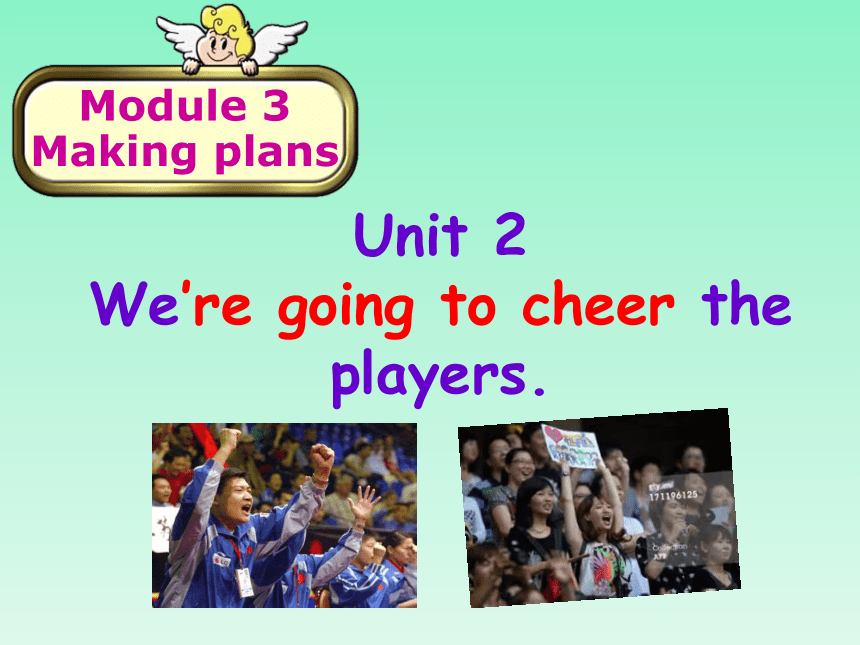
|
|
| 格式 | ppt | ||
| 文件大小 | 4.4MB | ||
| 资源类型 | 教案 | ||
| 版本资源 | 外研版 | ||
| 科目 | 英语 | ||
| 更新时间 | 2022-07-05 00:00:00 | ||
图片预览


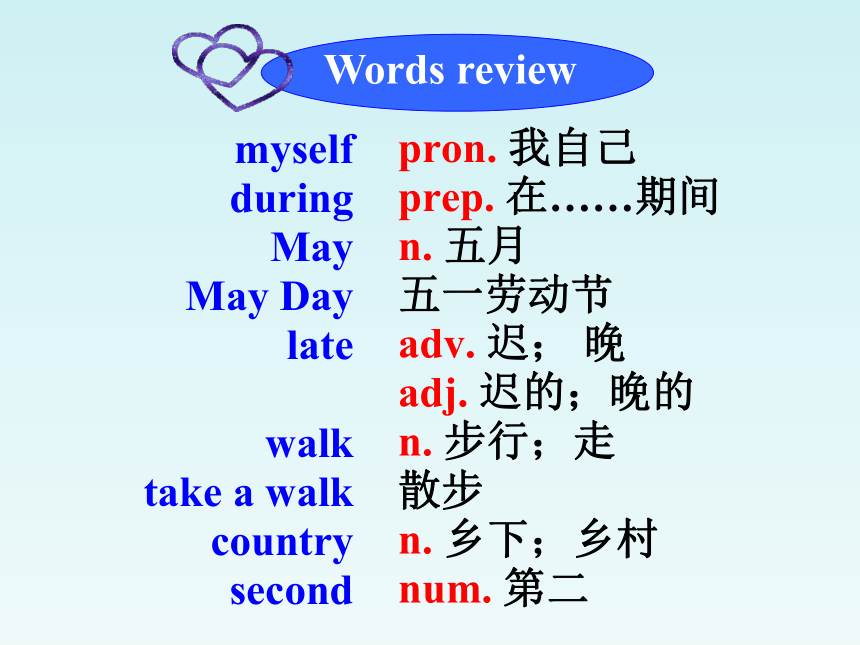
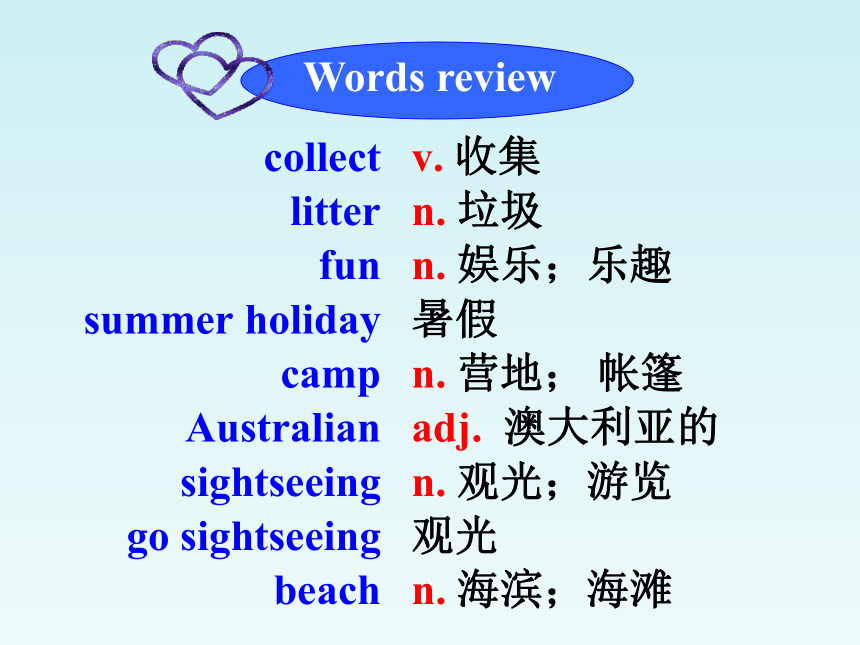
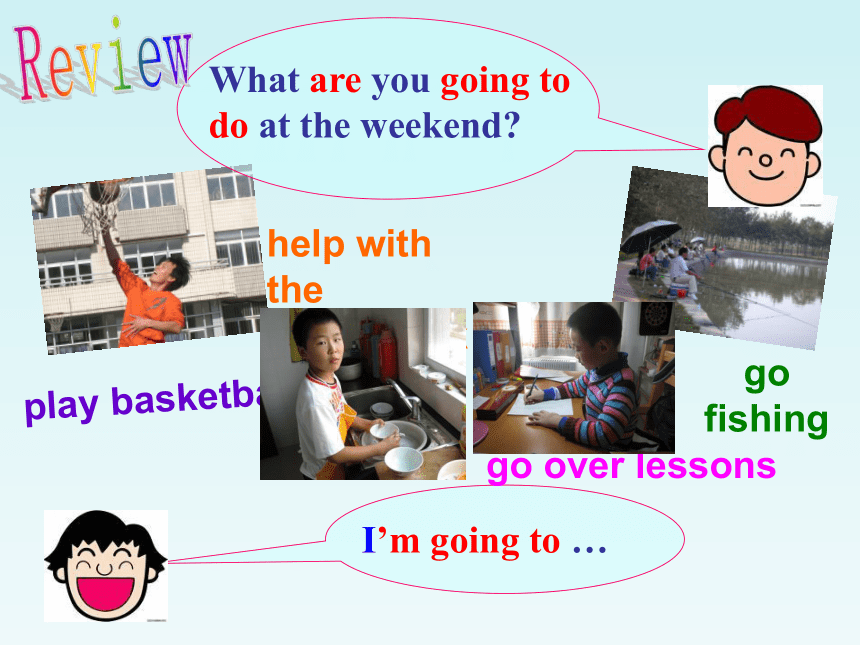
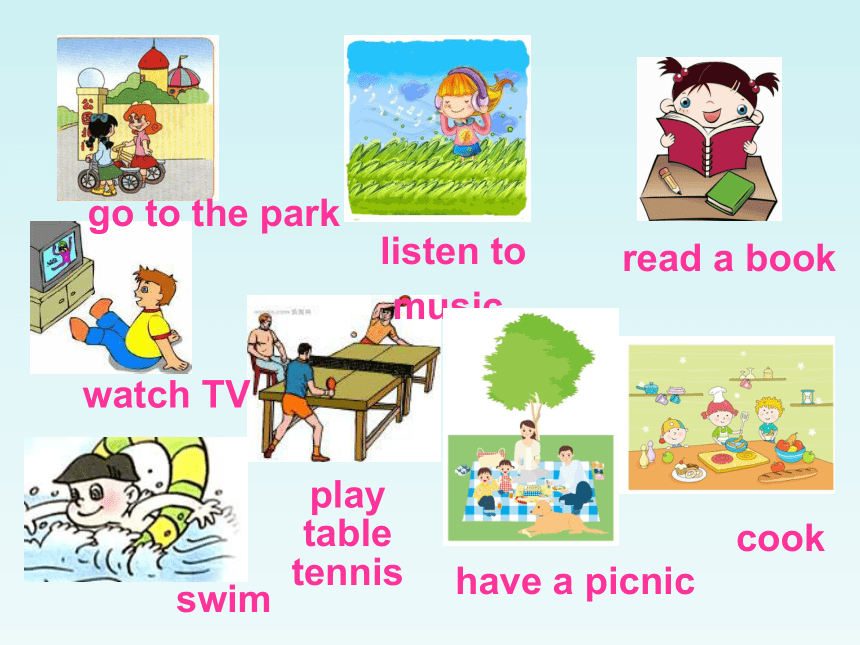
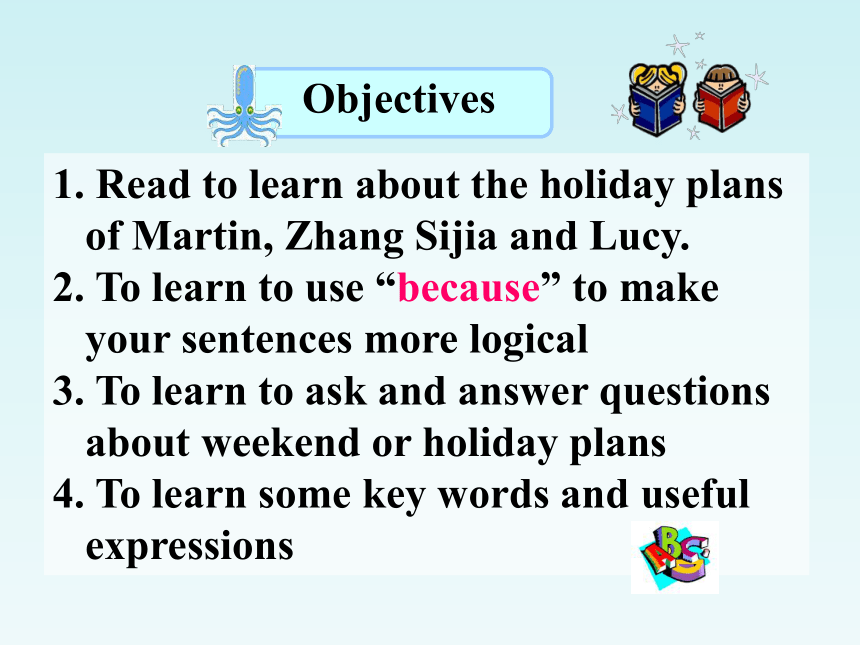
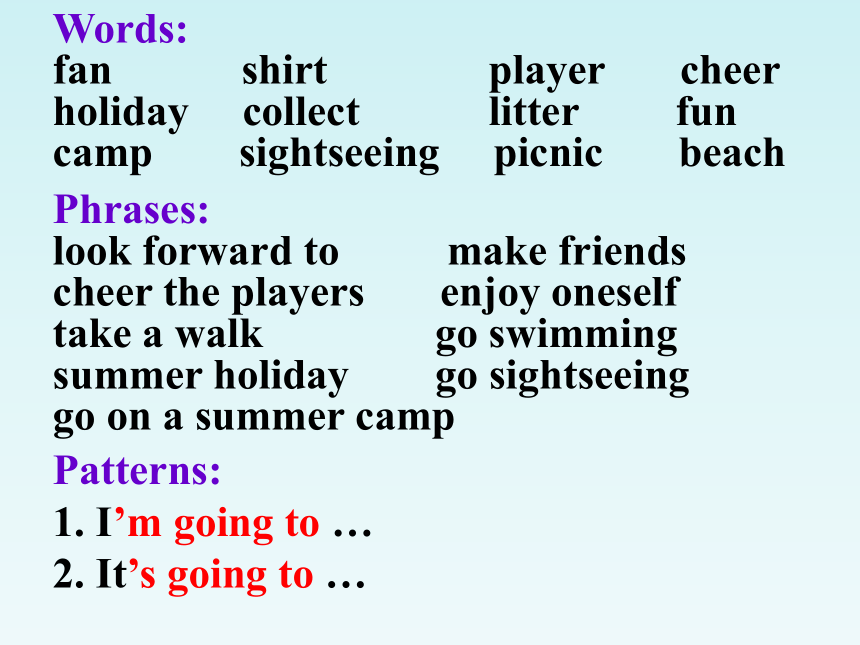
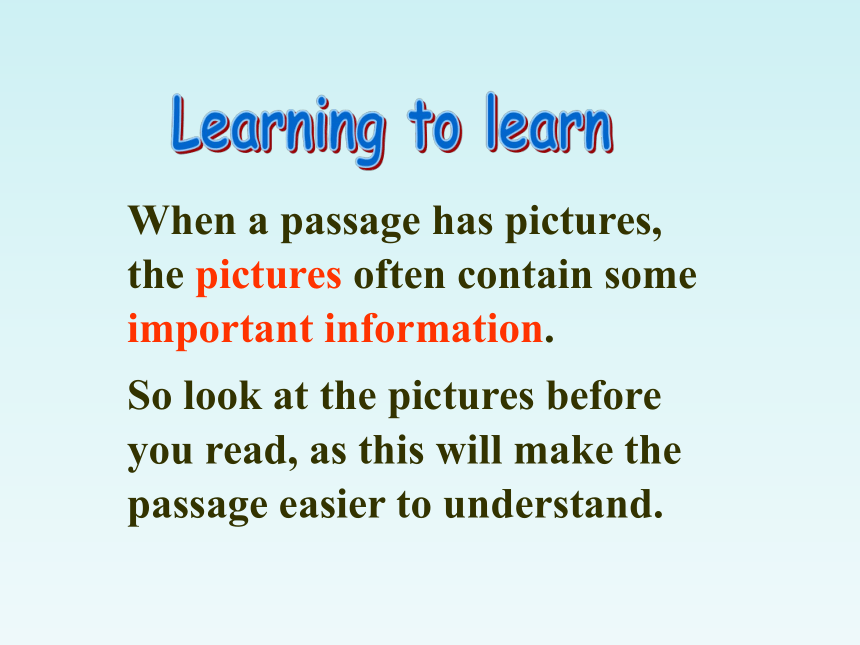
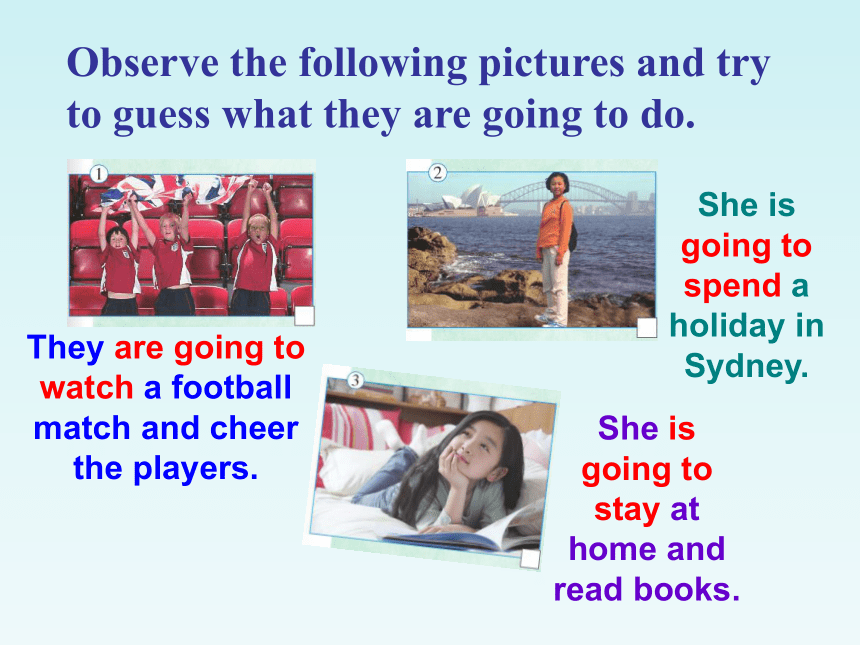
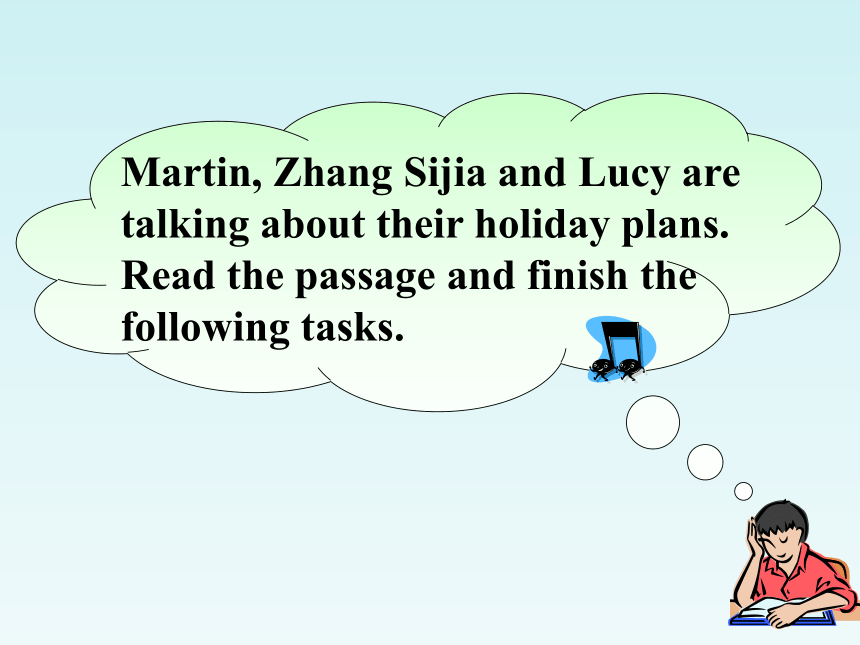
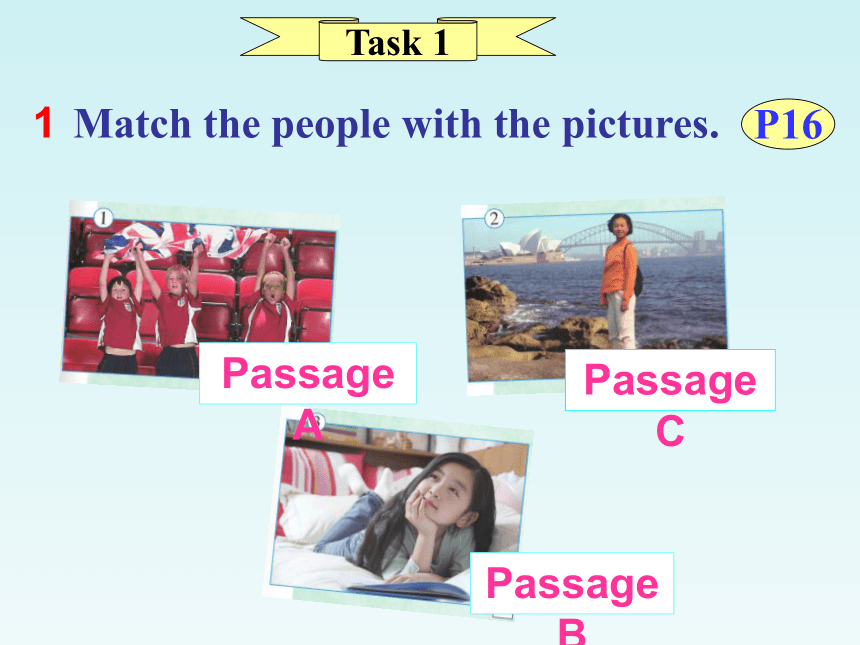
文档简介
(共40张PPT)
Unit 2 We’re going to cheer the players.
Module 3
Making plans
forward
look forward to
fan
make friends
shirt
cheer
player
hope
win
enjoy oneself
adv. 面向未来的;向前
盼望
n. 迷;支持者
交朋友
n. 球衣; (男式)衬衫
v. 为……喝彩
n. 运动员;选手
v. 希望
v. (won) 赢;获胜
过得愉快
Words review
单击播放录音
myself
during
May
May Day
late
walk
take a walk
country
second
pron. 我自己
prep. 在……期间
n. 五月
五一劳动节
adv. 迟; 晚
adj. 迟的;晚的
n. 步行;走
散步
n. 乡下;乡村
num. 第二
Words review
collect
litter
fun
summer holiday
camp
Australian
sightseeing
go sightseeing
beach
v. 收集
n. 垃圾
n. 娱乐;乐趣
暑假
n. 营地; 帐篷
adj. 澳大利亚的
n. 观光;游览
观光
n. 海滨;海滩
Words review
What are you going to do at the weekend
I’m going to …
go fishing
play basketball
go over lessons
help with the housework
swim
play table tennis
cook
watch TV
read a book
listen to music
have a picnic
go to the park
1. Read to learn about the holiday plans of Martin, Zhang Sijia and Lucy.
2. To learn to use “because” to make your sentences more logical
3. To learn to ask and answer questions about weekend or holiday plans
4. To learn some key words and useful expressions
Objectives
Words:
fan shirt player cheer holiday collect litter fun camp sightseeing picnic beach
Phrases:
look forward to make friends cheer the players enjoy oneself take a walk go swimming summer holiday go sightseeing
go on a summer camp
Patterns:
1. I’m going to …
2. It’s going to …
When a passage has pictures, the pictures often contain some important information.
So look at the pictures before you read, as this will make the passage easier to understand.
Observe the following pictures and try to guess what they are going to do.
They are going to watch a football match and cheer the players.
She is going to spend a holiday in Sydney.
She is going to stay at home and read books.
Martin, Zhang Sijia and Lucy are talking about their holiday plans. Read the passage and finish the following tasks.
Match the people with the pictures.
Passage A
Passage C
Passage B
Task 1
1
P16
Check (√) what they’re going to do.
2
Martin Zhang Sijia Lucy
watch a football match
spend time with family and friends
go on a summer camp
collect litter
stay with an Australian family
meet other football fans
√
√
√
√
√
√
Task 2
P16
Task 3
Read Passage A carefully and answer the questions below.
What is he looking forward to tomorrow
2. What is he going to do
He is looking forward to the football match.
He is going to watch his favourite team, meet other fans, make some new friends, wear the team shirt and cheer the players with his friends.
1
2
盼望
交一些新朋友
为运动员加油
take a walk in the country or go swimming
go out with her family and friends
get up late and then read a book
Read Passage B carefully and make a list about the things Zhang Sijia is going to do during the May Day holiday.
collect litter in the park
1
2
3
4
玩得高兴
散步
游泳
在公园里捡垃圾
1. Lucy usually spends the summer holiday at home. ( )
2. Lucy is going on a summer camp in New York City. ( )
3. Lucy is going to live at her friend’s home. ( )
4. Lucy is going to lie on the beach. ( )
×
×
√
Read Passage C carefully and check (√) the sentences.
Sydney.
have a picnic
in an Australian
family.
×
1
2
3
4
暑假
参加一个夏令营
去观光游览
because作连词,意为“因为”,表示因果关系,引导原因状语从句。
Work in pairs. Ask and answer the questions.
1. When is Martin going to watch a football match
2. What does Martin hope
3. Why is it going to be a busy holiday for Zhang Sijia
3
Tomorrow.
He hopes his favourite team will win the match.
Task 4
P17
Because she’s going to do a lot of things during the holiday.
Check your answers.
4. Why is this summer holiday going to be different for Lucy
5. Who is Lucy going to stay with
Because usually she spends the summer holiday at home, but this year she’s going on a summer camp in Sydney, Australia.
She is going to stay with an Australian family.
1
2
3
4,5
be going to do sth.可表示按计划或安排要发生的动作,有“准备;打算”的意思。这种主观意图,一般已做过事先安排,故其实现的可能性较大,其主语常为人。
be going to do sth.还可表示根据现有情况、某种迹象,判断将要或即将发生的动作。此时不含有主观意图,只是表示说话人对客观事态发展的判断或推测,此时主语可以是人,也可以是物。
Read the conversation and pay attention to the circled parts.
Australian beach camp cheer collect during forward fun hope litter player sightseeing something swimming win
Martin and his friends are going to watch their favourite football team play and (1)_____ the (2)_______. It’s going to be great (3)_____ and they (4)_____ their team gets the best score and (5)______ the match. Zhang Sijia is going to do something with her family and friends on May Day. They’re going to take a walk or go (6)_________.
swimming
cheer
players
fun
hope
wins
Complete the passage with the correct form of the words from the box.
4
P17
Task 5
There’s a lot of (7)____ in the park, and on 2nd May, they’re going to (8)______ it. (9)_______ her summer holiday, Lucy is going to a summer (10)_____ and is going
to stay with a(n) (11)_________ family. They’re going to the (12)_____ and are going (13)__________. She’s really looking (14)_______ to her holiday in Australia.
Australian beach camp cheer collect during forward fun hope litter player sightseeing something swimming win
litter
collect
During
camp
Australian
beach
sightseeing
forward
Hi! I’m French. I often travel with my parents in my summer holiday. I also enrich myself in libraries, museums and science centres.
Do you know what teenagers in other countries do in their summer holiday
I’m American. In my country, teenagers always do some voluntary work in our towns or in other towns. We can do a lot of things, such as cooking for the homeless and painting the old buildings.
Korean teenagers join in some activities in the summer holiday, such as travelling, climbing the mountains, swimming, etc. Our parents think these experiences can make us brave.
1. I’m looking forward to the football match tomorrow.
我期待明天的足球赛。
We look forward to hearing from you.
我们期待你的回音。
I’m looking forward to visiting you.
我期待拜访你。
look forward to (doing) sth. 表示“期盼(做)某事”,此处to为介词, 后接名词,代词或动名词形式。如:
2. We’re going to meet other fans, and make some new friends.
我们将会见到其他的球迷,并结交新朋友。
other作形容词时表示“别的,其他的”常用在名词前作定语,作代词时常与the连用,表示“(两个中)另外一个” 。
else作形容词时也表示“别的,其他的”,但用在who, what 等疑问词或something, nothing等不定代词后。
例如:
﹡ Do you want anything else to eat
﹡ What else do you want to say
﹡ I can’t answer your question. You’d better ask some other people.
﹡ I have two pens. One is red, and the other is black.
根据句意,用else 或other 填空。
1. What ________ can you say
2. Where are the ________ boys
else
other
3. I’m going to enjoy myself during the May Day holiday.
我要在五一假期好好玩一玩。
enjoy oneself表示“玩得高兴”,相当于have a good time和have fun,其中oneself要与主语保持人称和数的一致。 enjoy后可接名词或动名词作宾语,不能接不定式。如:
Peter is enjoying his dinner now.
皮特正在享受他的晚餐。
My father enjoys listening to the radio.
我爸爸喜欢听音乐。
—Why is Martin looking forward to tomorrow
—Martin is looking forward to tomorrow because he and his friends are going to watch their favourite team play football.
5
Look at the question and answer.
P17
because通常用来回答why提出的问题,引导原因状语从句,本身是个连词,连接两个完整的句子,because后面是原因。
because表示的原因是必然的因果关系,语气较强,通常放在主句之后,若需强调则放在主句之前。
Zhang Sijia is going to a park near her friend’s house because there is a lot of litter in the park and they’re going to collect it.
Now write answers to the questions. Use because.
1 Why is Zhang Sijia going to a park near her friend’s house
2 Why is this summer holiday going to be very different for Lucy
This summer holiday is going to be very different for Lucy because usually she spends the summer holiday at home, but this year she’s going on a summer camp in Sydney, Australia.
Work in pairs. Ask and answer the questions.
6
1 What are you looking forward to this weekend
2 What are you going to do
3 Why are you going to do it
P17
Possible answers:
… is going to see a movie on Saturday evening. He/She is looking forward to it because he/she likes the actors in it.
Now write about your partner.
本课时主要句型
总结回顾
1. look forward to
2. make friends
3. cheer the players
4. enjoy oneself
5. take a walk
6. go swimming summer holiday 7. go sightseeing
8. go on a summer camp
9. I’m going to …
10. It’s going to …
Now 2 minutes to test your spelling.
1. English-Chinese
go sightseeing beach litter camp during country summer holiday
2. Chinese-English
收集 散步 希望 过得愉快
盼望 赢;获胜 为……喝彩
When finishing, exchange your papers to see who does the best.
Ⅰ. 用所给单词的适当形式填空。
litter camp beach cheer player
1. After hearing the good news, they begin
to _____ for it.
2. —What are the children doing
—They are playing on the ______.
3. I’m going to buy a _____ for the trip.
4. —What does your brother do
—He is a ______.
5. Look! That boy is picking up some ______ on the ground.
Quiz
cheer
beach
camp
player
litter
Ⅱ. 根据提示写出正确的句子。
1. 他们正在北京观光。(go sightseeing)
_________________________________
2. 我每天在学校过得愉快。(enjoy oneself)
_________________________________
3. 晚饭后,你打算去散步吗?(take a walk) __________________________________
4. 她喜欢和孩子们交朋友。(make friends) __________________________________
5. 安妮盼望着见到她的姑姑。(look forward to) _____________________________________
They are going sightseeing in Beijing.
I enjoy myself at school every day.
Are you going to take a walk after dinner
She likes making friends with children.
Anne is looking forward to seeing her aunt.
Ⅲ. 用所给单词的适当形式完成下列小短文。
cheer, fan, win, fun, Australia
I have a new friend. His name is Kevin. He is an (1)_________ boy and he is good at playing table tennis. He has a lot of (2)_____ in our school. He says, “Playing table tennis is good (3)_____ for me. And it also can help me stay healthy. It is a part of my life now.” Kevin is going to have a table tennis match next Monday. We are going to (4)_____ him. We all want him to (5)____ the match. Good luck to him!
Australian
fans
fun
cheer
win
Homework
1. Write a passage about your holiday plans using the patterns we’ve learnt today.
2. Read the articles in Learning English.
Unit 2 We’re going to cheer the players.
Module 3
Making plans
forward
look forward to
fan
make friends
shirt
cheer
player
hope
win
enjoy oneself
adv. 面向未来的;向前
盼望
n. 迷;支持者
交朋友
n. 球衣; (男式)衬衫
v. 为……喝彩
n. 运动员;选手
v. 希望
v. (won) 赢;获胜
过得愉快
Words review
单击播放录音
myself
during
May
May Day
late
walk
take a walk
country
second
pron. 我自己
prep. 在……期间
n. 五月
五一劳动节
adv. 迟; 晚
adj. 迟的;晚的
n. 步行;走
散步
n. 乡下;乡村
num. 第二
Words review
collect
litter
fun
summer holiday
camp
Australian
sightseeing
go sightseeing
beach
v. 收集
n. 垃圾
n. 娱乐;乐趣
暑假
n. 营地; 帐篷
adj. 澳大利亚的
n. 观光;游览
观光
n. 海滨;海滩
Words review
What are you going to do at the weekend
I’m going to …
go fishing
play basketball
go over lessons
help with the housework
swim
play table tennis
cook
watch TV
read a book
listen to music
have a picnic
go to the park
1. Read to learn about the holiday plans of Martin, Zhang Sijia and Lucy.
2. To learn to use “because” to make your sentences more logical
3. To learn to ask and answer questions about weekend or holiday plans
4. To learn some key words and useful expressions
Objectives
Words:
fan shirt player cheer holiday collect litter fun camp sightseeing picnic beach
Phrases:
look forward to make friends cheer the players enjoy oneself take a walk go swimming summer holiday go sightseeing
go on a summer camp
Patterns:
1. I’m going to …
2. It’s going to …
When a passage has pictures, the pictures often contain some important information.
So look at the pictures before you read, as this will make the passage easier to understand.
Observe the following pictures and try to guess what they are going to do.
They are going to watch a football match and cheer the players.
She is going to spend a holiday in Sydney.
She is going to stay at home and read books.
Martin, Zhang Sijia and Lucy are talking about their holiday plans. Read the passage and finish the following tasks.
Match the people with the pictures.
Passage A
Passage C
Passage B
Task 1
1
P16
Check (√) what they’re going to do.
2
Martin Zhang Sijia Lucy
watch a football match
spend time with family and friends
go on a summer camp
collect litter
stay with an Australian family
meet other football fans
√
√
√
√
√
√
Task 2
P16
Task 3
Read Passage A carefully and answer the questions below.
What is he looking forward to tomorrow
2. What is he going to do
He is looking forward to the football match.
He is going to watch his favourite team, meet other fans, make some new friends, wear the team shirt and cheer the players with his friends.
1
2
盼望
交一些新朋友
为运动员加油
take a walk in the country or go swimming
go out with her family and friends
get up late and then read a book
Read Passage B carefully and make a list about the things Zhang Sijia is going to do during the May Day holiday.
collect litter in the park
1
2
3
4
玩得高兴
散步
游泳
在公园里捡垃圾
1. Lucy usually spends the summer holiday at home. ( )
2. Lucy is going on a summer camp in New York City. ( )
3. Lucy is going to live at her friend’s home. ( )
4. Lucy is going to lie on the beach. ( )
×
×
√
Read Passage C carefully and check (√) the sentences.
Sydney.
have a picnic
in an Australian
family.
×
1
2
3
4
暑假
参加一个夏令营
去观光游览
because作连词,意为“因为”,表示因果关系,引导原因状语从句。
Work in pairs. Ask and answer the questions.
1. When is Martin going to watch a football match
2. What does Martin hope
3. Why is it going to be a busy holiday for Zhang Sijia
3
Tomorrow.
He hopes his favourite team will win the match.
Task 4
P17
Because she’s going to do a lot of things during the holiday.
Check your answers.
4. Why is this summer holiday going to be different for Lucy
5. Who is Lucy going to stay with
Because usually she spends the summer holiday at home, but this year she’s going on a summer camp in Sydney, Australia.
She is going to stay with an Australian family.
1
2
3
4,5
be going to do sth.可表示按计划或安排要发生的动作,有“准备;打算”的意思。这种主观意图,一般已做过事先安排,故其实现的可能性较大,其主语常为人。
be going to do sth.还可表示根据现有情况、某种迹象,判断将要或即将发生的动作。此时不含有主观意图,只是表示说话人对客观事态发展的判断或推测,此时主语可以是人,也可以是物。
Read the conversation and pay attention to the circled parts.
Australian beach camp cheer collect during forward fun hope litter player sightseeing something swimming win
Martin and his friends are going to watch their favourite football team play and (1)_____ the (2)_______. It’s going to be great (3)_____ and they (4)_____ their team gets the best score and (5)______ the match. Zhang Sijia is going to do something with her family and friends on May Day. They’re going to take a walk or go (6)_________.
swimming
cheer
players
fun
hope
wins
Complete the passage with the correct form of the words from the box.
4
P17
Task 5
There’s a lot of (7)____ in the park, and on 2nd May, they’re going to (8)______ it. (9)_______ her summer holiday, Lucy is going to a summer (10)_____ and is going
to stay with a(n) (11)_________ family. They’re going to the (12)_____ and are going (13)__________. She’s really looking (14)_______ to her holiday in Australia.
Australian beach camp cheer collect during forward fun hope litter player sightseeing something swimming win
litter
collect
During
camp
Australian
beach
sightseeing
forward
Hi! I’m French. I often travel with my parents in my summer holiday. I also enrich myself in libraries, museums and science centres.
Do you know what teenagers in other countries do in their summer holiday
I’m American. In my country, teenagers always do some voluntary work in our towns or in other towns. We can do a lot of things, such as cooking for the homeless and painting the old buildings.
Korean teenagers join in some activities in the summer holiday, such as travelling, climbing the mountains, swimming, etc. Our parents think these experiences can make us brave.
1. I’m looking forward to the football match tomorrow.
我期待明天的足球赛。
We look forward to hearing from you.
我们期待你的回音。
I’m looking forward to visiting you.
我期待拜访你。
look forward to (doing) sth. 表示“期盼(做)某事”,此处to为介词, 后接名词,代词或动名词形式。如:
2. We’re going to meet other fans, and make some new friends.
我们将会见到其他的球迷,并结交新朋友。
other作形容词时表示“别的,其他的”常用在名词前作定语,作代词时常与the连用,表示“(两个中)另外一个” 。
else作形容词时也表示“别的,其他的”,但用在who, what 等疑问词或something, nothing等不定代词后。
例如:
﹡ Do you want anything else to eat
﹡ What else do you want to say
﹡ I can’t answer your question. You’d better ask some other people.
﹡ I have two pens. One is red, and the other is black.
根据句意,用else 或other 填空。
1. What ________ can you say
2. Where are the ________ boys
else
other
3. I’m going to enjoy myself during the May Day holiday.
我要在五一假期好好玩一玩。
enjoy oneself表示“玩得高兴”,相当于have a good time和have fun,其中oneself要与主语保持人称和数的一致。 enjoy后可接名词或动名词作宾语,不能接不定式。如:
Peter is enjoying his dinner now.
皮特正在享受他的晚餐。
My father enjoys listening to the radio.
我爸爸喜欢听音乐。
—Why is Martin looking forward to tomorrow
—Martin is looking forward to tomorrow because he and his friends are going to watch their favourite team play football.
5
Look at the question and answer.
P17
because通常用来回答why提出的问题,引导原因状语从句,本身是个连词,连接两个完整的句子,because后面是原因。
because表示的原因是必然的因果关系,语气较强,通常放在主句之后,若需强调则放在主句之前。
Zhang Sijia is going to a park near her friend’s house because there is a lot of litter in the park and they’re going to collect it.
Now write answers to the questions. Use because.
1 Why is Zhang Sijia going to a park near her friend’s house
2 Why is this summer holiday going to be very different for Lucy
This summer holiday is going to be very different for Lucy because usually she spends the summer holiday at home, but this year she’s going on a summer camp in Sydney, Australia.
Work in pairs. Ask and answer the questions.
6
1 What are you looking forward to this weekend
2 What are you going to do
3 Why are you going to do it
P17
Possible answers:
… is going to see a movie on Saturday evening. He/She is looking forward to it because he/she likes the actors in it.
Now write about your partner.
本课时主要句型
总结回顾
1. look forward to
2. make friends
3. cheer the players
4. enjoy oneself
5. take a walk
6. go swimming summer holiday 7. go sightseeing
8. go on a summer camp
9. I’m going to …
10. It’s going to …
Now 2 minutes to test your spelling.
1. English-Chinese
go sightseeing beach litter camp during country summer holiday
2. Chinese-English
收集 散步 希望 过得愉快
盼望 赢;获胜 为……喝彩
When finishing, exchange your papers to see who does the best.
Ⅰ. 用所给单词的适当形式填空。
litter camp beach cheer player
1. After hearing the good news, they begin
to _____ for it.
2. —What are the children doing
—They are playing on the ______.
3. I’m going to buy a _____ for the trip.
4. —What does your brother do
—He is a ______.
5. Look! That boy is picking up some ______ on the ground.
Quiz
cheer
beach
camp
player
litter
Ⅱ. 根据提示写出正确的句子。
1. 他们正在北京观光。(go sightseeing)
_________________________________
2. 我每天在学校过得愉快。(enjoy oneself)
_________________________________
3. 晚饭后,你打算去散步吗?(take a walk) __________________________________
4. 她喜欢和孩子们交朋友。(make friends) __________________________________
5. 安妮盼望着见到她的姑姑。(look forward to) _____________________________________
They are going sightseeing in Beijing.
I enjoy myself at school every day.
Are you going to take a walk after dinner
She likes making friends with children.
Anne is looking forward to seeing her aunt.
Ⅲ. 用所给单词的适当形式完成下列小短文。
cheer, fan, win, fun, Australia
I have a new friend. His name is Kevin. He is an (1)_________ boy and he is good at playing table tennis. He has a lot of (2)_____ in our school. He says, “Playing table tennis is good (3)_____ for me. And it also can help me stay healthy. It is a part of my life now.” Kevin is going to have a table tennis match next Monday. We are going to (4)_____ him. We all want him to (5)____ the match. Good luck to him!
Australian
fans
fun
cheer
win
Homework
1. Write a passage about your holiday plans using the patterns we’ve learnt today.
2. Read the articles in Learning English.
同课章节目录
- Module 1 Lost and found
- Unit 1 Whose bag is this?
- Unit 2 Are they yours?
- Unit 3 Language in use
- Module 2 What can you do ?
- Unit 1 I can play the piano
- Unit 2 I can run really fast
- Unit 3 Language in use
- Module 3 Making plans
- Unit 1 What are you going to do at the weekends?
- Unit 2 We're going to cheer the players.
- Unit 3 Language in use
- Module 4 Life in the future
- Unit 1 Everyone will study at home
- Unit 2 Every family will have a small plane.
- Unit 3 Language in use
- Module 5 Shopping
- Unit 1 What can I do for you?
- Unit 2 You can buy everything on the Internet
- Unit 3 Language in use
- Module 6 Around town
- Unit 1 Could you tell me how to get to the Nationa
- Unit 2 The London Eye is on your right.
- Unit 3 Language in use
- Revision module A
- Module 7 My past life
- Unit 1 I was born in a small village.
- Unit 2 I was born in Quincy.
- Unit 3 Language in use
- Module 8 Story time
- Unit 1 Once upon a time….
- Unit 2 Goldilocks hurried out of the house.
- Unit 3 Language in use
- Module 9 Life history
- Unit 1 He left school and began work at the age of
- Unit 2 He decided to be an actor.
- Unit 3 Language in use
- Module 10 A holiday journey
- Unit 1 What did you do?
- Unit 2 This morning we took a walk.
- Unit 3 Language in use
- Module 11 Body language
- Unit 1 They touch noses!
- Unit 2 Here are some ways to welcome them.
- Unit 3 Language in use
- Module 12 Western music
- Unit 1 It's so beautiful!
- Unit 2 Vienna is the centre of European classical
- Unit 3 Language in use
- Revision module B
